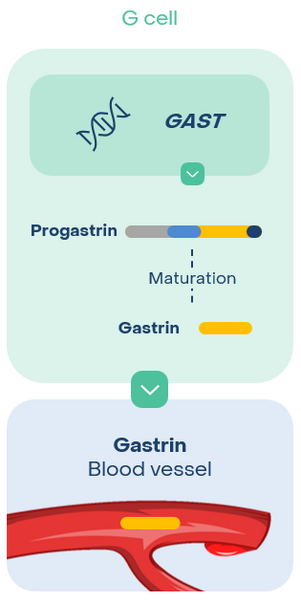What is hPG80?
Progastrin is an intracellular protein that is, or not, maturated into gastrin.
Non-Pathological Condition

Progastrin is not detected in the blood of healthy subjects.
Pathological Condition

hPG80 (circulating progastrin) is detected in the blood of cancer patients.
The ROCHE laboratory markets a test for the detection of Progastrin-releasing peptide (Pro-GRP) to differentiate between 2 types of lung cancer. hPG80 (Progastrin) and Progastrin-releasing peptide (Pro-GRP) are two completely different proteins even though they share the word "Progastrin / Pro-Gastrin” with the same phonetics.
hPG80: a biomarker significantly higher in the blood of cancer patients

-
Meta-analysis of all retrospective and prospective studies, published and unpublished data.
-
N=4,085 patients with cancers & N=1,199 healthy subjects.
Adapted from You et al, 2020; Kholi et al, 2021; Chauhan et al, 2022; Dupuy et al, 2022, Prieur et al, 2023; Doucet et al, 2023, You et al, 2023 and Hofman et al, 2023 and unpublished data
hPG80: a biomarker of cancer activity
Tumoral mass
Peripheral tissue

The biomarker hPG80 is detectable in the tumor/bloodstream of cancer patients at every stage of tumor progression, from the primary tumor to metastasis.
This figure illustrates the high expression of hPG80 by tumor cells from pancreatic and liver cancer (A) and (B), respectively. The tissues peripheral to the tumor masses were devoid of hPG80-immunoreactive cells (C) and (D). Scale bars: 25 µm.
Immunomarking of cancer biopsy hPG80: red, Heparan sulfates: green, Cell nuclei: blue
You et al. EBioMedicine 2020
Close link between Wnt pathway, Cancer and hPG80
The Wnt signaling pathway is dysregulated in cancer.

Zhong et al, Cancer Metastatic review (2020)
The Wnt signaling pathway regulates a wide range of cellular functions during development and adulthood, including cell proliferation, cell fate determination, apoptosis, cell migration and cell polarity during development and stem cell maintenance in adults.
It is dysregulated in most cancers.
It plays a important role in the development of cancer and is involved in key features of cancer.
The GAST gene and progastrin are overexpressed via the Wnt oncogenic pathway.

-
The GAST gene, which encodes progastrin, is a target of the Wnt/ß-catenin/ Tcf4 oncogenic pathway.
-
GAST and consequently hPG80 are overexpressed in tumor tissues.
-
Once secreted, hPG80 will trigger a positive feedback loop that will activate the Wnt signaling pathway, further amplifying hPG80 secretion.
Joubert et al, under submission
hPG80 is a pro-oncogenic factor.
It has been shown that hPG80 plays a major role in tumor promotion and progression:
-
Pro-angiogenic factor
-
Anti-apoptotic factor
-
Regulation of cell-cell junctions
-
Cancer stem cells survival
hPG80 neutralization:
-
Inhibits Wnt-dependent tumorigenicity in vivo.
-
Induces differentiation of cancer cells and then their death by apoptosis.
-
Reduces tumor neovascularization in xenograft cells in nude mice.

